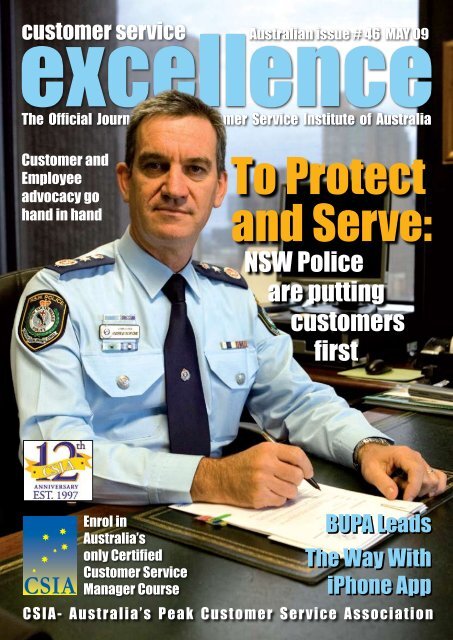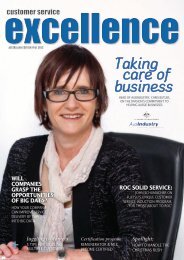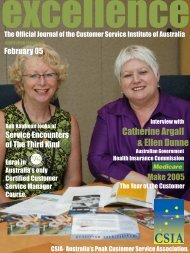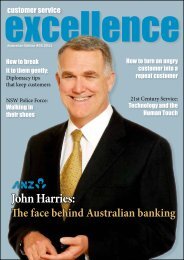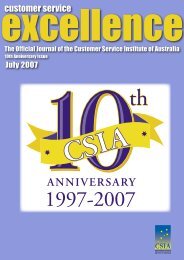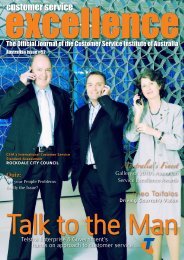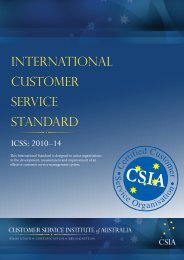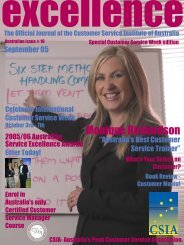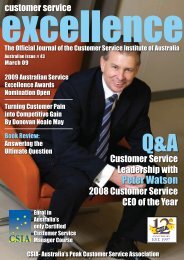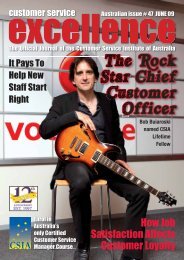NSW Police: Serving Our Community - Customer Service Institute of ...
NSW Police: Serving Our Community - Customer Service Institute of ...
NSW Police: Serving Our Community - Customer Service Institute of ...
You also want an ePaper? Increase the reach of your titles
YUMPU automatically turns print PDFs into web optimized ePapers that Google loves.
customer service<br />
Australian issue # 46 MAY 09<br />
The Official Journal <strong>of</strong> the <strong>Customer</strong> <strong>Service</strong> <strong>Institute</strong> <strong>of</strong> Australia<br />
<strong>Customer</strong> and<br />
Employee<br />
advocacy go<br />
hand in hand<br />
<strong>NSW</strong> <strong>Police</strong><br />
are putting<br />
customers<br />
first<br />
Enrol in<br />
Australia’s<br />
only Certified<br />
<strong>Customer</strong> <strong>Service</strong><br />
Manager Course<br />
BUPA Leads<br />
The Way With<br />
iPhone App<br />
CSIA- Australia’s Peak <strong>Customer</strong> <strong>Service</strong> Association
excellence | Cover Story<br />
serving our<br />
community<br />
This month <strong>Customer</strong> <strong>Service</strong><br />
Excellence sat down with <strong>NSW</strong><br />
<strong>Police</strong> Commissioner Andrew<br />
Scipione and Assistant<br />
Commissioner Catherine Burn<br />
to talk about the <strong>Police</strong> Force’s<br />
bold new customer service<br />
programme, the challenges it<br />
has faced and the policing way<br />
<strong>of</strong> the future. By Isabel Staas<br />
communities want<br />
their police to be<br />
accessible, pr<strong>of</strong>essional<br />
“<strong>Our</strong><br />
and helpful, to take<br />
appropriate action at all times and to keep<br />
them informed about developments in their<br />
matters,” announced <strong>NSW</strong> <strong>Police</strong><br />
Commissioner Andrew Scipione when he<br />
publicly launched the <strong>NSW</strong> <strong>Police</strong> Force<br />
<strong>Customer</strong> <strong>Service</strong> Charter in February this<br />
year.<br />
Mr Scipione has responded to this<br />
challenge by leading The <strong>NSW</strong> <strong>Police</strong><br />
Force <strong>Customer</strong><br />
<strong>Service</strong> Program which aims to make<br />
<strong>NSW</strong> <strong>Police</strong> the most customer focused<br />
police force in Australia.<br />
It is a bold agenda. In order for the<br />
<strong>Customer</strong> <strong>Service</strong> Program to be effective,<br />
a shift has to take place in the culture <strong>of</strong> the<br />
Force. As Mr Scipione told CSE when we<br />
sat down with him recently, “We need to<br />
develop the mindset that this is the way we<br />
do things around here. It has to become<br />
ingrained in the fabric <strong>of</strong> the force.” Two<br />
major initiatives have been undertaken in<br />
this cultural change effort; first, the<br />
<strong>Customer</strong> <strong>Service</strong> Charter and second, a<br />
major certified training program.<br />
The <strong>Customer</strong> <strong>Service</strong> Charter was the<br />
result <strong>of</strong> meticulous research and<br />
community consultation. The Charter has<br />
6 CUSTOMER SERVICE EXCELLENCE<br />
THE MONTHLY MAGAZINE OF THE CUSTOMER SERVICE INSTITUTE OF AUSTRALIA
een nominated for a 2009 Australian <strong>Service</strong><br />
Excellence Award. Assistant Commissioner<br />
Catherine Burn is the Corporate Sponsor <strong>of</strong><br />
the <strong>Customer</strong> <strong>Service</strong> Program. In 2007 she<br />
was part <strong>of</strong> a team which met with the <strong>NSW</strong><br />
Ombudsman who asked them to examine<br />
their customer complaint levels. At this time<br />
Ms Burn was in charge <strong>of</strong> the Pr<strong>of</strong>essional<br />
Standards Command and Andrew Scipione<br />
was in the process <strong>of</strong> taking over the<br />
commissionership. Ass Comm. Burn<br />
explained to me how this simple request<br />
became a far reaching and ambitious program<br />
<strong>of</strong> cultural change, “It didn’t take us long to<br />
realise that this was about more than just<br />
complaints. It is a far bigger issue and from<br />
January last year we have embarked on a<br />
journey to address the root causes rather than<br />
simply respond to the negative results.”<br />
The first step taken was to begin a dialogue<br />
with <strong>NSW</strong> <strong>Police</strong> ‘customers’, essentially the<br />
wider community. This community<br />
engagement began with a series <strong>of</strong> focus<br />
groups which were designed to solicit honest<br />
opinions about the <strong>Police</strong> Force from<br />
members <strong>of</strong> the public. The focus groups<br />
were attended by the Commissioner and the<br />
police minister at the time, David Campbell.<br />
“What surprised me was how many people<br />
held this organisation in such regard” Says<br />
Mr Scipione <strong>of</strong> the results <strong>of</strong> the focus groups.<br />
“It was a great opportunity to feel the pulse <strong>of</strong><br />
the community. Because they didn’t know<br />
who the work was being done for there was<br />
an opportunity to reflect on some candid and<br />
honest opinions. From day one <strong>of</strong> my<br />
commissionership I pulled the assistant<br />
commissioners aside and set out a task for<br />
them. I told them we need to connect in a way<br />
we have never connected before with those<br />
that we serve in the community.”<br />
<strong>NSW</strong> <strong>Police</strong> used the results <strong>of</strong> these focus<br />
groups as well as consultation with other<br />
stakeholders to formulate the <strong>NSW</strong> <strong>Police</strong><br />
<strong>Customer</strong> <strong>Service</strong> Charter. Importantly, in the<br />
eyes <strong>of</strong> Catherine Burn, was the consultation<br />
which was held with <strong>of</strong>ficers <strong>of</strong> <strong>NSW</strong> <strong>Police</strong>.<br />
“About 16% responded to the call for<br />
submissions, that’s 2800 <strong>of</strong>ficers! Ideas were<br />
taken from these submissions and incorporated<br />
into the final version.”<br />
“We could have just copied a charter;<br />
plenty <strong>of</strong> other police forces have one and it<br />
would have taken us three days. That would<br />
have been the easy way out and it wouldn’t<br />
have worked. Instead we undertook a journey,<br />
which lasted a year, which was an essential<br />
part <strong>of</strong> the process.” Ms Burn believes in the<br />
power <strong>of</strong> the charter to help change the<br />
attitude <strong>of</strong> <strong>of</strong>ficers to customer service as a<br />
concept. “The commitments are so simple so<br />
everyone can remember them.”<br />
Criminal suspects and those under arrest<br />
are fully covered by legislation and formal<br />
police policy. <strong>Customer</strong>s, as defined by the<br />
charter, are listed as ‘victims, witnesses, the<br />
community and police internal colleagues.’<br />
These groups have never before been<br />
protected by the policy and legislation<br />
afforded to suspects and those in custody<br />
before now. “The front line <strong>of</strong>ficer needs to<br />
understand that 99% is about the community,<br />
only 1% is about law enforcement and<br />
interaction with actual criminals.<br />
“Part <strong>of</strong> the journey we have undertaken is<br />
to define who our customers are. We were<br />
bold in doing this.” She says, referring to the<br />
statement on the charter which excludes<br />
people in custody or criminal suspects from<br />
being afforded the charter promises. “I knew<br />
if this wasn’t addressed effectively it would<br />
have been a major road block in the customer<br />
service journey.”<br />
Mr Scipione explains the importance <strong>of</strong> the<br />
distinction “If we exclude that group, the<br />
suspects, we can focus on the people we<br />
traditionally haven’t seen as our customers.<br />
That is the 80% or more <strong>of</strong> the community<br />
that we would probably never, ever come into<br />
contact with unless they become a victim or a<br />
witness.”<br />
The program has also made a special effort<br />
to put a human face on the public who the<br />
police encounter. “The charter makes it so<br />
much easier for the constable on the front desk<br />
at a station or answering the phone to<br />
understand that we really need to look after the<br />
Cover Story | excellence<br />
Information<br />
Commissioner Scipione<br />
joined <strong>NSW</strong> <strong>Police</strong> in<br />
1980. Following<br />
experience in general<br />
and traffic duties he<br />
worked as a detective<br />
in the CIB and<br />
Bankstown Detectives.<br />
He was subsequently<br />
seconded to the National Crime Authority in<br />
1985. In 1992 he was appointed to the rank <strong>of</strong><br />
Detective Inspector at the Joint Technical<br />
<strong>Service</strong>s Group and in 1995 was promoted to<br />
the rank <strong>of</strong> Detective Superintendent<br />
(Commander) at the Special Technical<br />
Investigation Branch (formerly JTSG). During the<br />
period 1992 to 1998, he was also a Senior <strong>NSW</strong><br />
<strong>Police</strong> Counter Terrorist Advisor to SAC-PAV. In<br />
1998 he was appointed to the position <strong>of</strong> Chief<br />
<strong>of</strong> Staff to the <strong>NSW</strong> <strong>Police</strong> Commissioner and in<br />
2001 was appointed as the Assistant<br />
Commissioner in charge <strong>of</strong> Special Crime &<br />
Internal Affairs. He was appointed as Deputy<br />
Commissioner in February 2002 and as<br />
Commissioner <strong>of</strong> <strong>Police</strong> on 1 September 2007.<br />
He holds a Masters Degree in Management<br />
(Macquarie University) a Graduate Diploma in<br />
<strong>Police</strong> Management (Macquarie University) and<br />
a Graduate Certificate in Security Management<br />
(Edith Cowan University). He is a Fellow <strong>of</strong> the<br />
Australian <strong>Institute</strong> <strong>of</strong> Management, a Member<br />
<strong>of</strong> the Australian <strong>Institute</strong> <strong>of</strong> Company Directors<br />
and a Graduate <strong>of</strong> the FBI National Executive<br />
<strong>Institute</strong>.<br />
THE MONTHLY MAGAZINE OF THE CUSTOMER SERVICE INSTITUTE OF AUSTRALIA CUSTOMER SERVICE EXCELLENCE<br />
7
excellence | Cover Story<br />
good people. It aligns those good people to<br />
those that matter most to our <strong>of</strong>ficers, their<br />
family and friends. It makes you start asking<br />
questions in your mind, such as,’If my mum<br />
went into the police station, because she was in<br />
trouble or needed help or wanted some advice,<br />
how would I want her treated’”, says Mr<br />
Scipione.<br />
“It provides guidelines for <strong>of</strong>ficers, a full<br />
framework,” says Ms Burn. “Prior to this<br />
program there was nothing from which our<br />
<strong>of</strong>ficers could work from.” Now all employees<br />
<strong>of</strong> the <strong>NSW</strong> <strong>Police</strong> Force are measured on<br />
their ability to comply with customer service<br />
standards, including the Commissioner.<br />
“The <strong>NSW</strong> State Plan holds every Chief<br />
Executive <strong>of</strong> every department accountable<br />
for the requirements that have been set out for<br />
their department,” says Mr Scipione. “We<br />
believe that the <strong>Customer</strong> <strong>Service</strong> Program<br />
will help us fulfil sections R1, R3 and S8.” R1<br />
and R3 <strong>of</strong> the State Plan refer to reducing<br />
crime and antisocial behaviour, S8 refers to<br />
increasing customer satisfaction <strong>of</strong> government<br />
departments.<br />
(The State Plan can be viewed at http://<br />
www.nsw.gov.au/stateplan/index.aspx).<br />
How will this happen Both Mr Scipione<br />
and Ms Burn believe firmly that connecting<br />
with the community will help police fighting<br />
crime immensely. “The benefits <strong>of</strong> this<br />
program are real. We are to showing <strong>of</strong>ficers<br />
that customer service isn’t some fluffy, feel<br />
good concept. It is an essential part <strong>of</strong> their job<br />
and it will help them do their job better,” says<br />
Ms Burn. “We can increase community<br />
confidence in us, increase cooperation, obtain<br />
better information. We will have victims who<br />
are more willing to come forward and report.<br />
When they do report, if we look after them<br />
properly, we will maintain the relationship and<br />
they’ll turn up at court. At the moment, so<br />
many <strong>of</strong> our failed prosecutions are due to<br />
victims not willing to go through with<br />
prosecutions. Better customer service is one<br />
way that we can influence<br />
this.”<br />
Mr Scipione <strong>of</strong>fers<br />
real pro<strong>of</strong> <strong>of</strong> the<br />
way that<br />
o f f i c e r s<br />
engaging<br />
in best<br />
practice<br />
Top: Catherine Burn, Matthew Hanlon, Michael Murphy, Phil Flogel. Bottom Left: In the classroom<br />
Bottom Right: CSIA Trainer, Rebecca Potter with Tony Unicomb<br />
customer service will help the police fight<br />
crime. “A body <strong>of</strong> work came from the<br />
International Association <strong>of</strong> Chiefs <strong>of</strong> <strong>Police</strong><br />
that highlighted the notion <strong>of</strong> getting back to<br />
the basics. The key to ‘getting back to basics’<br />
is understanding that the community is not<br />
here to serve us; we are here to serve the<br />
community. Work in the U.K. has proven this.<br />
They are ‘Walking the Talk’, where town<br />
meetings are held with police, local politicians<br />
and the general public. These meetings allow<br />
people to raise safety and crime concerns with<br />
the police; it encourages honest dialogue. A<br />
natural progression from this is where a team<br />
will walk through the troubled areas <strong>of</strong> a town<br />
and identify issues which can improve safety.<br />
The community is involved, the local<br />
government is involved and the police can<br />
work with both groups to institute real changes<br />
in order to prevent crime.”<br />
How, one begins to wonder, will the top<br />
brass drill this into frontline <strong>of</strong>ficers in a<br />
meaningful way<br />
Over the past four months, <strong>NSW</strong> <strong>Police</strong><br />
<strong>of</strong>ficers have undergone certificate four<br />
training with a CSIA designed and accredited<br />
course, customised for police customer service<br />
managers. This training is an essential element<br />
in the success <strong>of</strong> this ambitious culture change<br />
effort. “Prior to this undertaking our customer<br />
service strategy was wholly re-active. In the<br />
past you received customer service training<br />
after to being reported several times for<br />
customer service related complaints. The<br />
training wasn’t integrated nor was it<br />
preventative. We are working on equipping<br />
our staff better. We are educating them,” says<br />
Ms Burn.<br />
Assistant Commissioner Burn has<br />
undertaken the Advance Course which is<br />
nationally recognised as a Diploma <strong>of</strong><br />
Business. “Personally I think it’s pretty<br />
impressive to have a Diploma <strong>of</strong> Business in<br />
this field,” she says <strong>of</strong> the qualification. “The<br />
<strong>of</strong>ficers should be very proud <strong>of</strong> the<br />
qualifications they receive from this course. It<br />
isn’t easy but the benefits are instantly<br />
visible.”<br />
“The training is a major part <strong>of</strong> our<br />
maintenance program,” says Mr Scipione. He<br />
and other executive level <strong>of</strong>ficers have received<br />
training from CSIA which he believes is<br />
essential for the customer focussed culture to<br />
become embedded in the <strong>Police</strong> Forces daily<br />
8 CUSTOMER SERVICE EXCELLENCE<br />
THE MONTHLY MAGAZINE OF THE CUSTOMER SERVICE INSTITUTE OF AUSTRALIA
Cover Story| excellence<br />
We could have just copied a charter; plenty <strong>of</strong><br />
other police forces have one and it would have<br />
taken us three days. That would have been the<br />
easy way out and it wouldn’t have worked.<br />
Instead we undertook a journey, which lasted a<br />
year, which was an essential part <strong>of</strong> the process.<br />
activities. “That means it needs to come<br />
through at every level and as a sign at how<br />
committed we are to the customer service<br />
training that we are rolling out, it will be given<br />
to senior people starting with me.”<br />
The training will be completed by all 19,000<br />
police <strong>of</strong>ficers and civilian staff by 2010. To<br />
ensure this happens it has been included in<br />
performance agreements. This is a key feature<br />
<strong>of</strong> the sustainability plan designated to maintain<br />
the momentum the program has gathered.<br />
“Sustainability is about the messages you<br />
send, it’s about reaffirming through<br />
performance measures and standards and we<br />
do that through the compass process. It’s about<br />
continuing to embed this mindset at every<br />
level through training, from the most junior<br />
recruit to the most senior <strong>of</strong>ficer.” Mr Scipione<br />
goes on to explain the momentum needed to<br />
sustain the program in terms <strong>of</strong> Newton’s Law<br />
<strong>of</strong> Inertia “Once you get something moving it<br />
<strong>of</strong>ten self powers. If we remove the roadblocks<br />
nothing is going to stop it. 19 000 is an<br />
enormous organisation, spread across<br />
thousands and thousands <strong>of</strong> kilometres in a<br />
very busy state. We need this program to be<br />
able to propel itself if we are going to<br />
succeed.”<br />
“We can’t afford to lose this momentum. If<br />
we do we will never be able to start this process<br />
again.” says Ms Burn. She understands more<br />
than most how policy initiatives can fall by the<br />
wayside in a conservative organisation like<br />
<strong>NSW</strong> <strong>Police</strong>. “It is really essential that we have<br />
launched this program from an operational<br />
command. The Commissioner was very smart<br />
to attach this to a high pr<strong>of</strong>ile region, The<br />
Sydney Metro Regional Command.”<br />
Some <strong>of</strong> the team which CSIA have been<br />
working with during this phase <strong>of</strong> the journey<br />
will soon be returning to their regular duties.<br />
“We have had a rotating team on this program.<br />
Information<br />
Assistant Commissioner<br />
Catherine Burn<br />
joined the <strong>NSW</strong> <strong>Police</strong> in<br />
1984. She has spent<br />
much <strong>of</strong> her career<br />
working as a criminal<br />
investigator, including<br />
general detectives, homicide, strike forces<br />
and special crime and internal affairs.<br />
In 2002 Assistant Commissioner Burn<br />
commenced as the Local Area Commander<br />
at Burwood and in 2005 was transferred to<br />
Redfern Local Area Command as the<br />
Commander. She also spent some time as<br />
the relieving Commander at City Central and<br />
was the <strong>NSW</strong> <strong>Police</strong> liaison <strong>of</strong>ficer for the<br />
Parliamentary Inquiry into Redfern and<br />
Waterloo. She was appointed as Assistant<br />
Commissioner, Pr<strong>of</strong>essional Standards on 4<br />
December, 2006.<br />
Assistant Commissioner Burn holds a<br />
Bachelor <strong>of</strong> Arts degree, an Honours Degree<br />
in Psychology and a Masters <strong>of</strong> Management.<br />
She was awarded the National Medal in<br />
2000 and the <strong>Police</strong> Medal for 20 years<br />
service in 2004. Assistant Commissioner<br />
Burn has also been awarded three<br />
Commissioner’s Commendations throughout<br />
her career. She was awarded Burwood<br />
Citizen <strong>of</strong> the Year in 2005 and has recently<br />
been awarded 2007 Woman <strong>of</strong> the Year for<br />
the Heffron electorate (Redfern). On January<br />
26th 2007, she was awarded the Australian<br />
<strong>Police</strong> Medal.<br />
THE MONTHLY MAGAZINE OF THE CUSTOMER SERVICE INSTITUTE OF AUSTRALIA CUSTOMER SERVICE EXCELLENCE<br />
9
excellence | Cover Story<br />
It is fantastic for spreading the message<br />
because they return to their commands within<br />
three months and start spreading the word.”<br />
says Ms Burn. She sees credibility as one <strong>of</strong><br />
the most important factors in creating the<br />
culture shift required to make this program<br />
stick.<br />
“The Commissioner has been adamant that<br />
the program stay with an operational area.<br />
Reward and Recognition is also an important<br />
factor in maintain and sustaining such an<br />
ambitious program. Ms Burn believes that<br />
<strong>of</strong>ficers gaining qualifications will be a reward<br />
in itself. She has also gained approval to<br />
present annual customer service awards to<br />
outstanding <strong>of</strong>ficers.<br />
Mr Scipione points out the most valuable<br />
recognition an employee can receive. “It’s the<br />
recognition from your peers that really matters.<br />
The reward and recognition that truly matter<br />
is when those around me know that I am a<br />
person has taken mediocrity out <strong>of</strong> my<br />
vocabulary. That I am a person who lives to<br />
do everything to a standard that has been set<br />
very high for a reason, purely because I<br />
believe in excellence.”<br />
The <strong>Police</strong> Weekly magazine publishes<br />
compliments received from the public. It is<br />
seen by both Ms Burn and Mr Scipione as a<br />
great motivator. “Everyone reads <strong>Police</strong><br />
Weekly because it is where promotions are<br />
listed,” jokes Mr Scipione. The magazine also<br />
publishes best practice tips in customer<br />
service.<br />
“We have customer service policy holders<br />
in every Local Area Command, that’s 130,<br />
who receive newsletters and exchange tips<br />
regularly. The communication strategy has<br />
been a real victory.” says Ms Burn.<br />
Recent independent mystery shopper results<br />
out <strong>NSW</strong> <strong>Police</strong> at the top <strong>of</strong> a very impressive<br />
group <strong>of</strong> organisations but both Mr Scipione<br />
and Ms Burn are reserved in their claiming <strong>of</strong><br />
victory though. Mr Scipione is philosophical<br />
about the progress they have made. He says<br />
“You’ve seen how serious we are about this, as<br />
the executive and as the chief <strong>of</strong> police.. It’s<br />
too tempting in this day <strong>of</strong> instant everything<br />
to celebrate the victory when you’ve won the<br />
toss. This is an event that is going to go on for<br />
a long time. Well after I’m gone the organisation<br />
and the customers will still be there. It’s an<br />
exciting time for <strong>NSW</strong> <strong>Police</strong>.”<br />
The police have an advantage in this time <strong>of</strong><br />
cultural change says Mr Scipione. Firstly the<br />
drive is there from the top. “People sense the<br />
mood <strong>of</strong> the commissioner and the executive<br />
that looks after department,” he says. Secondly,<br />
the discipline which is ingrained in the<br />
organisation is a central factor to the program’s<br />
future success. “The police force is a disciplined<br />
organisation. We make a living out <strong>of</strong> following<br />
The front line <strong>of</strong>ficer<br />
needs to understand<br />
that 99% is about the<br />
community, only 1% is<br />
about law enforcement<br />
and interaction with<br />
actual criminals.<br />
rules. Many police find themselves in positions<br />
and doing jobs that no one else would want to<br />
do. It’s a combination <strong>of</strong> firm direction and<br />
discipline that comes from being an <strong>of</strong>ficer<br />
which will help this program be sustained into<br />
the future. I think if it is corralled in the right<br />
way and pointed in the right direction; it’s a<br />
very powerful tool.”<br />
Mr Scipione concludes with another sage<br />
perspective on this undertaking:<br />
“Why do I see customer service as being<br />
important Because serving customers means<br />
investing into the safety and security <strong>of</strong><br />
communities.. After 9/11 people were<br />
screaming out from leadership and they wanted<br />
it from the police.<br />
“And so I see this whole notion <strong>of</strong> improving<br />
customer service as being the driver for us to<br />
deliver the leadership that the community right<br />
across this state is seeking today. I may see the<br />
benefits in my time as commissioner, I would<br />
suspect. I would hope, though, in generations<br />
to come the leadership that will be brought by<br />
this organisation will be improved and<br />
increased. I hope that it will be at the level<br />
where by police are held at the level <strong>of</strong> esteem<br />
I know they deserve.<br />
“The goal behind the goal in this for me<br />
is to allow police to really bring leadership<br />
to their communities and I think that’s a<br />
really important thing to focus on. This<br />
may not be seen to be the hard edge <strong>of</strong><br />
policing. But let me tell you, it sets you up<br />
so you can bring the hard edge <strong>of</strong> policing<br />
in when it’s needed.”<br />
Isabel Staas is the<br />
Editor <strong>of</strong> <strong>Customer</strong><br />
<strong>Service</strong> Excellence<br />
Magazine. She is a<br />
graduate <strong>of</strong> the<br />
University <strong>of</strong><br />
Technology, Sydney<br />
holding a Bachelor’s<br />
degree in<br />
Communications<br />
(Writing and Cultural Studies. She has over six<br />
years experience in retail customer service.<br />
Isabel has contributed to the Sydney Morning<br />
Herald among other publications. Most<br />
recently was a contributing author in Lines <strong>of</strong><br />
Wisdom (Affirm Press, Melbourne).<br />
10 CUSTOMER SERVICE EXCELLENCE<br />
THE MONTHLY MAGAZINE OF THE CUSTOMER SERVICE INSTITUTE OF AUSTRALIA
Text | excellence<br />
THE MONTHLY MAGAZINE OF THE CUSTOMER SERVICE INSTITUTE OF AUSTRALIA CUSTOMER SERVICE EXCELLENCE<br />
11


